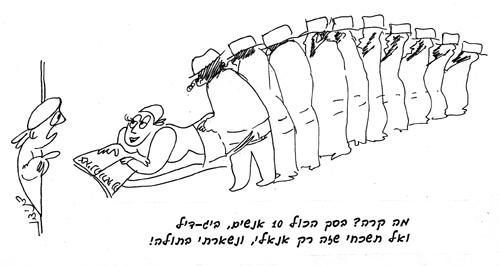
A man who marries a woman must acquire her in order to wed her as his wife. The early sages ruled that there are three ways in which a woman can be acquired: money, contract, or sexual relations. The scholars tried to clarify the Scriptural source for these acts of acquisition, for the Torah does not mention the manner of acquisition, speaking of it as a fait accompli and as a prerequisite for other laws: “When a man acquires a woman…” It is written “If any man acquires a wife and goes in to her and detests her, and charges her with shameful conduct, and brings a bad name on her…” (Deuteronomy 22:13). The Scriptures do not specify whether an act of acquisition is required, what that act might be; the acquisition is a self-evident fact preceding the chain of events which take place after the wedding — the husband, after having sexual relations with his new wife, gives her a bad name.
Also: “When a man acquires a wife and marries her, and it happens that she finds no favor in his eyes because he has found some uncleanness in her, and he writes her a certificate of divorce, puts it in her hand, and sends her out of his house” (Deuteronomy 24:1), where the acquisition is a precondition for an explanation of how a man divorces a woman, and “When a man has acquired a new wife, he shall not go out to war…” (Deuteronomy 24:5).
Thus, for example, the sages discuss the Scriptural source which teaches that sexual relations are an act of acquisition. Answer: In the section discussing the adulterous wife the words who has had relations with a husband: “If a man is found lying with a woman who has had relations with a husband, then both of them shall die — the man that lay with the woman, and the woman” (Deuteronomy 22:22). Since it is written who has had relations with a husband, it implies, according to the sage R’ Avahu, that a man is made a husband by having relations with his wife. A different sage, R’ Zira, asked why the above sage did not bring the opinion of Rabbi Judah the Nasi, who brought proof from a different verse: “Is what Rabbi learned ugly?” Rabbi Judah brought his proof from the verse “If any man acquires a wife and goes in to her,” meaning that he has had relations with her and thus acquires her!
Answer: The verse which Rabbi Judah the Nasi cites leaves room for interpreting it to mean that acquisition requires both a monetary transaction and then sexual relations, and only after the completion of both acts of acquisition is the woman considered married. Therefore the sage above brought a different verse as his source. The scholars asked: How is it possible to think that the Scriptures demand two acts of acquisition for marriage? If that were the case, there would be no such thing as a betrothed virgin for whom the Scriptures demand death by stoning if she is caught in adultery. If a man must acquire her with money and then have relations with her, she is no longer a virgin, and if he has not yet had relations with her, only acquired her with money, she is not considered betrothed and it is as though she has done nothing (for two acquisitions are needed for marriage). Answer: The case is that the husband, after acquiring her with money, had anal sex with her, so she is still considered a virgin. The scholars then asked: Is it not the case that if the husband had anal sex with her she is considered to have had sexual relations and so, though she is still physically a virgin, she is not so legally? Where do we find the source of the law that if a husband has anal sex with his wife she is considered as one who has had sexual relations and not as a virgin? The sages said that a betrothed virgin who has had anal sex with ten men, one after the other, is still a virgin, and all are stoned to death because of her, as is the rule for one who has sexual relations with a betrothed virgin, but if the husband has anal sex with her, the next man who has sex with her is sentenced to death by strangulation, because she is considered a man’s wife and no longer a virgin. In any case, we return to our earlier question: how can there be a betrothed virgin if two acts of acquisition are required, both money and sexual relations? Answer: If she was wed using a contract (and not money), for one acquired through contract is considered betrothed and a virgin.
(Babylonian Talmud, Tractate Kiddushin 9b)
